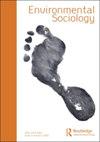这将如何影响我们的信用评级?:市政债务和环境治理
IF 2.8
Q3 ENVIRONMENTAL STUDIES
引用次数: 1
摘要
摘要通过分析城市供水组织使用的多种形式的债务,我提出了证据,证明当代公共治理的财务结构使财务利益对自然资源的管理产生了不应有的影响。本研究使用了与美国最大的饮用水供应商——南加州大都会水务区(MWD)有关的财务统计和定性数据,这是一个具有实证意义的案例研究。市政水务机构通过传统来源收集收入,包括水销售和税收,但他们也通过各种债务工具筹集大量资金。在这项研究中,我首先观察到收入支持债务的强劲增长,取代了税收支持债务,成为主要的资金来源。接下来,我将研究自本世纪中叶以来,随着水销售的初级增长和税收的边缘化,收入是如何变化的。最后,我分析了金融看门人——信用评级机构——对私人金融资本日益依赖的影响。我发现,评级机构对水资源管理者推行以财务为导向的目标,包括将水商品化以实现收入最大化、避免支出、无视稀缺的气候现实等。我提出了金融反馈和机构的金融病理学的概念,作为表征这些过程的概念工具。本文章由计算机程序翻译,如有差异,请以英文原文为准。
‘How will this affect our credit rating?’: municipal debt and governing the environment
ABSTRACT By analyzing the multiple forms of debt used by municipal water supply organizations, I present evidence to argue that the financial structures of contemporary public governance give financial interests undue influence over the management of natural resources. This study uses financial statistics and qualitative data pertaining to the largest provider of drinking water in the US, Metropolitan Water District of Southern California (MWD), an empirically significant case study. Municipal water agencies collect revenues through traditional sources including water sales and tax collections, but they also raise significant funding with a variety of debt instruments. In this study, I first observe a strong increase in revenue-backed debt, supplanting tax-backed debt, as the primary source of funding. Next, I examine how revenues have shifted since mid-century with water sales growing primary and taxation becoming peripheral. Lastly, I analyze the influence of financial gatekeepers – credit rating agencies – considering the growing reliance on private financial capital. I find that rating agencies push finance-oriented objectives on water managers that include commodifying water to maximize revenue, avoiding expenditures, and flouting climatological realities of scarcity, among others. I propose the notions of financial feedbacks and the financial pathology of institutions as conceptual tools for characterizing these processes.
求助全文
通过发布文献求助,成功后即可免费获取论文全文。
去求助
来源期刊

Environmental Sociology
ENVIRONMENTAL STUDIES-
CiteScore
4.60
自引率
12.00%
发文量
34
期刊介绍:
Environmental Sociology is dedicated to applying and advancing the sociological imagination in relation to a wide variety of environmental challenges, controversies and issues, at every level from the global to local, from ‘world culture’ to diverse local perspectives. As an international, peer-reviewed scholarly journal, Environmental Sociology aims to stretch the conceptual and theoretical boundaries of both environmental and mainstream sociology, to highlight the relevance of sociological research for environmental policy and management, to disseminate the results of sociological research, and to engage in productive dialogue and debate with other disciplines in the social, natural and ecological sciences. Contributions may utilize a variety of theoretical orientations including, but not restricted to: critical theory, cultural sociology, ecofeminism, ecological modernization, environmental justice, organizational sociology, political ecology, political economy, post-colonial studies, risk theory, social psychology, science and technology studies, globalization, world-systems analysis, and so on. Cross- and transdisciplinary contributions are welcome where they demonstrate a novel attempt to understand social-ecological relationships in a manner that engages with the core concerns of sociology in social relationships, institutions, practices and processes. All methodological approaches in the environmental social sciences – qualitative, quantitative, integrative, spatial, policy analysis, etc. – are welcomed. Environmental Sociology welcomes high-quality submissions from scholars around the world.
 求助内容:
求助内容: 应助结果提醒方式:
应助结果提醒方式:


